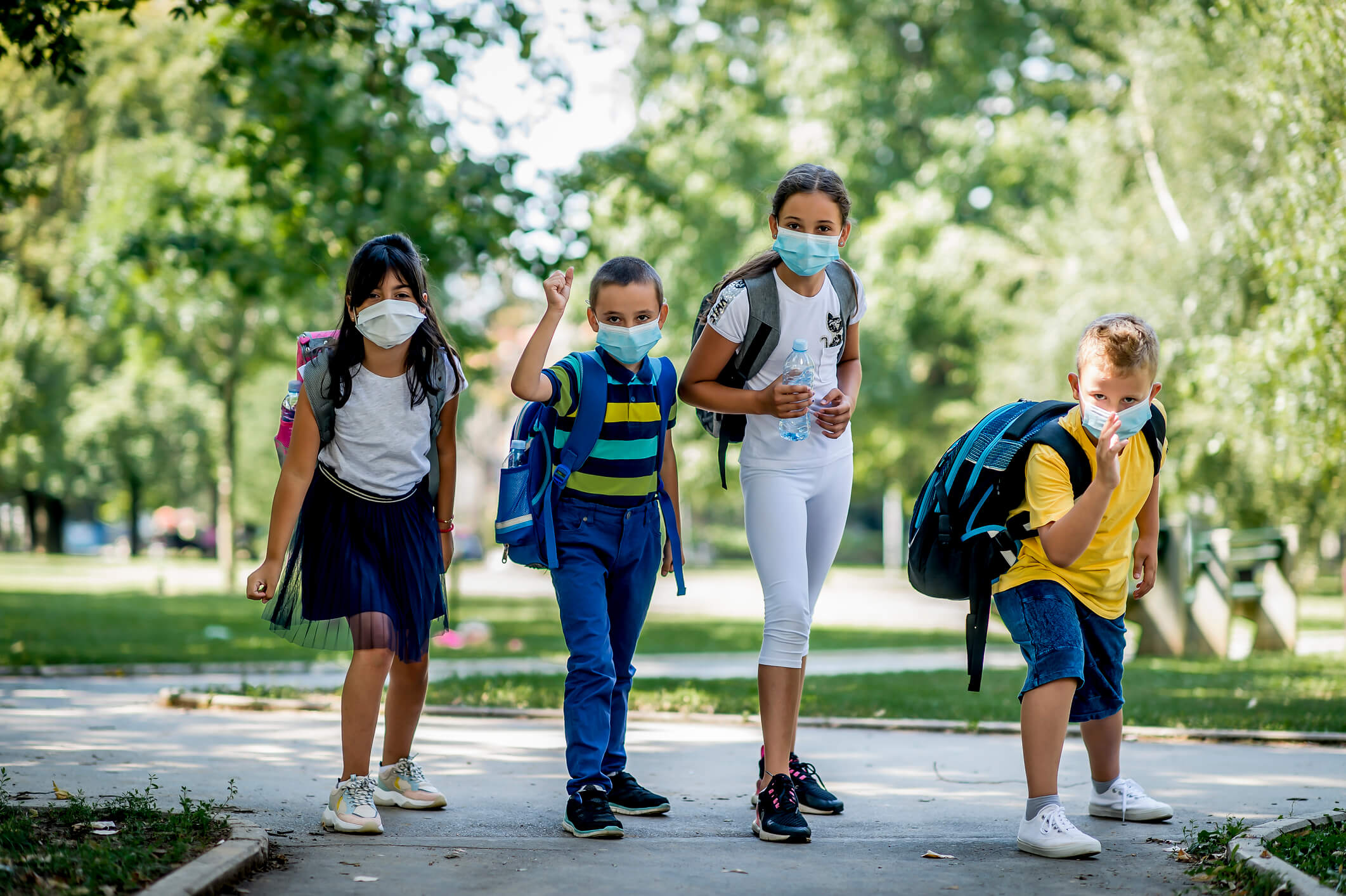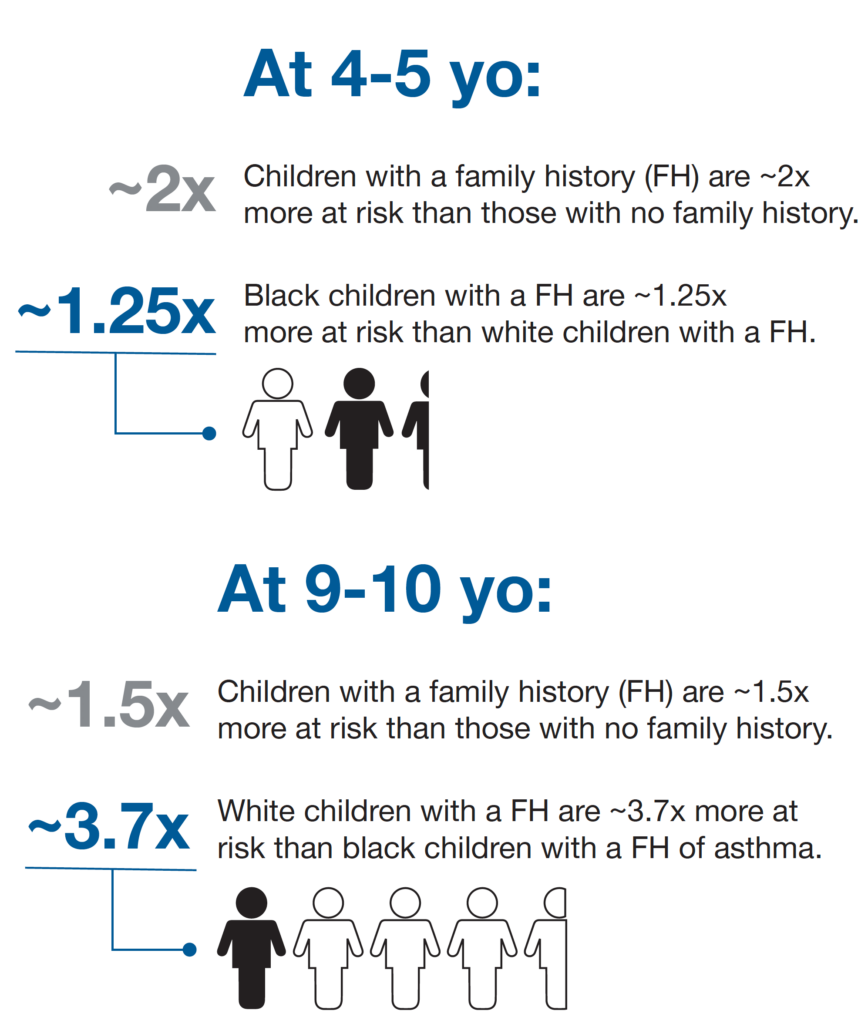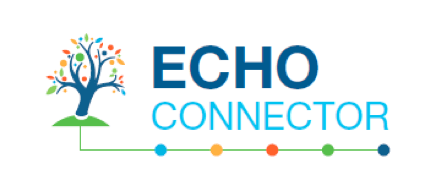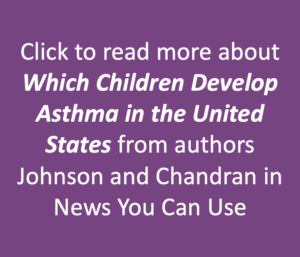
Welcome to the ECHO Connector! The Environmental influences on Child Health Outcomes (ECHO) Program is a research program, at the NIH, with the mission to enhance the health of children for generations to come. The ECHO Connector will keep you informed of program news and our latest research findings.
Message from Matt
A Message from the ECHO Director, Matthew W. Gillman, MD

May is National Asthma and Allergy Awareness Month.
Nearly 5.5 million children in the U.S. are living with asthma, a respiratory disease that causes much suffering and loss of days at school and work.
ECHO investigators aim to fill gaps in research on conditions that affect kids’ airways by studying data from our pediatric cohorts and by testing interventions in our IDeA States Pediatric Clinical Trials Network. With its large sample size, diverse populations, and ongoing studies, the ECHO Program is well positioned to conduct studies that can help researchers and doctors better understand, prevent, and treat asthma in children.
I’m pleased that this month’s ECHO Connector includes some of ECHO’s latest research in our upper and lower airways outcome area. While many studies have focused on children who already have asthma, it’s also important to know who is at highest risk of getting asthma, so that researchers and doctors can better understand how to prevent it. In a paper by ECHO researchers published in JAMA Pediatrics this month, ECHO researchers share new findings about which groups of children are most likely to get an asthma diagnosis as they grow up.
In other news, the NIH ECHO Program Office recently released a Request for Information (RFI) to solicit input from the scientific community and the general public about enhancing ECHO science. I encourage you to provide input to this RFI, due to NIHKidsandEnironment@od.nih.gov and sonia.arteaga@nih.gov by Tuesday, June 8, and share it with your networks and colleagues. Your input will be critical to enhancing ECHO research.
In addition, the ECHO Program is sponsoring a free workshop on preconception research this June 17-18, and I encourage you to register. This virtual workshop will feature presentations by NIH Director Dr. Francis Collins and other experts who will discuss the state of the science, research gaps, and opportunities related to how preconception exposures may influence child health outcomes.

—Matthew W. Gillman, M.D., S.M.
Back to top
Upcoming Events for you to Join
Preconceptional Origins of Child Health Outcomes Workshop
 Join us on June 17 and 18 for a free workshop about preconception research. Registration is now open. The workshop aims to:
Join us on June 17 and 18 for a free workshop about preconception research. Registration is now open. The workshop aims to:
- Assess the state of the science, research gaps, and opportunities related to how preconception exposures may influence child health outcomes.
- Discuss how to overcome operational challenges in conducting preconception cohort studies.
Inclusion of Diverse Participants in Pragmatic Clinical Trials Workshop Series
The NIH Health Care Systems Research Collaboratory is hosting a free workshop series centered around strategies for the inclusion of diverse participants in clinical trials.
- May 14, 1 pm ET: Keynote: Diverse Representation Among Clinical Trial Participants: Why It Is Important and How Can We Improve (recording now available)
- June 4, 1 pm ET: Planning for Diversity: Stakeholder Engagement and Site Selection to Maximize Diversity
- June 25, 1 pm ET: Meeting Participants Where They Are: Outreach, Trust, and Consent to Maximize Diversity
- July 16, 1 pm ET: Maximizing Diversity in PCTs: What Can We Learn From Implementation Trials?
Click here for a full schedule of upcoming webinars.
Back to top
![]()
ECHO Program Spotlight
Investigating Childhood Asthma with ECHO Researchers
This Asthma and Allergy Awareness Month, we sat down with two ECHO investigators to discuss their recent publication, which examines the relationship between age, race, and childhood asthma. Chris Johnson, PhD, MPH of Henry Ford Health System and Aruna Chandran, MD, MPH of Johns Hopkins University Bloomberg School of Public Health co-authored the manuscript, US Childhood Asthma Incidence Rate Patterns From the ECHO Consortium to Identify High-Risk Groups for Primary Prevention. This publication highlights the need for a better understanding of how demographics affect which children are more likely to have or develop asthma, to improve asthma management and prevention.
Behind the Research
As an epidemiologist, Dr. Johnson notes how important incidence rates of asthma are for understanding the disease. Leveraging the ECHO-wide Cohort was crucial for this research and for further understanding the origins and causes of this respiratory illness. “We didn’t have a good handle on incidence of [this] disease,” says Dr. Johnson, “and with ECHO, what’s exciting is that the numbers and variation is large, so we are in a good place to get numbers for incidence rates for different populations.” Thus far, most of the knowledge about asthma in children comes from prevalence data (the proportion of children who report having asthma at a certain point in time). However, incidence data (the number of children who develop disease during a particular time period) is what is needed to design prevention interventions. “To date, information on asthma incidence in the U.S. has been reported in just a small number of studies done in very specific localized populations,” says Dr. Chandran. This research demonstrates that a combination of genetic susceptibility, environmental impacts, and socioeconomic status are likely linked to childhood asthma. Dr. Chandran notes that it is important to recognize the racial and socioeconomic disparities we see in asthma incidence rates, and this research was an amazing opportunity to utilize the ECHO-wide Cohort for this important initial step in improving our understanding of asthma.
The Impact of Asthma and Further Research
Asthma can be linked to many long-term child health outcomes. Reduced lung function can affect a child for the rest of their lives. Children with asthma often miss school and or may not be up for high-intensity physical activities due to a fear of asthma exacerbation. “Just having a certain medical condition, such as asthma, puts you at high risk for many other health conditions,” Dr. Chandran noted.
This research is just the beginning of further investigation that needs to be done on childhood asthma. Dr. Johnson suggests further research on the specific racial and ethnic groups at highest risk for developing asthma, on the waxing and waning nature of the disease, and on the incidence rates of rare but serious severe asthma. Even observing prenatal health as an origin of asthma can demonstrate where to focus future research efforts to find solutions to prevent asthma.
The Face of ECHO ISPCTN Clinical Trials

A clinical Research Coordinator (RC) is a specialized research professional working with the clinical Principal Investigator (PI), who leads a clinical trial. While the PI is responsible for the overall design and management of the trial, the success of the clinical trial depends in part on the RC’s abilities to successfully manage the day-to-day study operations.
The duties of the RC include making sure that clinical research and study activities follow the federal rules; designing training materials; protecting the rights and welfare of research participants; presenting and completing the informed consent; scheduling study visits; and collecting data required by the study protocol. However, an important role that is often overlooked is the hard work that goes into building trusting relationships with participants and family members from the first introduction of the study, which very often results in a participant agreeing to join the study, and staying committed to the study until the very end. The RC in many ways is “the face of the study”.
The benefits of building a trusting relationship with study participants is clear in the Vitamin D Oral Replacement in Asthma (VDORA1) study currently happening across 17 states in the U.S. The study teams successfully recruited 88 participants with a 99% retention rate for study visits kept.
“Making research fun, engaging and exciting for the participants is so important,” explains Jennifer Faiella, RN from the Montana study site. “Participants need to know how important their contribution to research really is and communicating this message often to the participant and family encourages them to stick with it. As a research coordinator on the VDORA1 trial, I appreciate how much children and their families genuinely enjoy participating in this study. I believe the experience has given them more confidence and motivation to take an active role in their asthma management and overall health”.
Back to top
News You Can Use

 New Nationwide ECHO Study Investigates Childhood Asthma Risk
New Nationwide ECHO Study Investigates Childhood Asthma Risk
Asthma is a complex disease stemming from both genetic and environmental factors, and the severity and frequency of symptoms can vary from child to child. The primary symptom of asthma is episodic wheezing. Transient episodes of wheezing are most common in children under four, but a subset of children will experience the ongoing episodes of wheezing associated with asthma. To more effectively prevent and treat asthma in these children, researchers and doctors seek to understand the demographic and genetic factors of childhood asthma risk.
Many previous studies of childhood asthma risk have looked at the association between demographic factors and asthma prevalence. A new nationwide ECHO study, US Childhood Asthma Incidence Rate Patterns From the ECHO Consortium to Identify High-Risk Groups for Primary Prevention, investigated how these demographic factors contribute to the rate of asthma diagnosis in children. The study, conducted by ECHO researchers Dr. Chris Johnson, PhD, MPH and Dr. Aruna Chandran, MD, MPH, used data from 31 ECHO cohorts to determine at what age children were diagnosed with asthma. The researchers then compared the rate of initial asthma diagnosis for different groups at various ages. The study found that children with a family history of the disease were about twice as likely to receive an asthma diagnosis before age 5. For boys, this risk decreased with age, but for girls, the risk stayed mostly stagnant.
 The ECHO study also investigated the relationship between race and asthma diagnosis. At around four years old, Black children with a family history of the disease were approximately 1.25 times more likely to receive an asthma diagnosis than White children with a family history of asthma. The study found that, by the age of ten, White children were 3.7 times more likely to receive an asthma diagnosis than Black children.
The ECHO study also investigated the relationship between race and asthma diagnosis. At around four years old, Black children with a family history of the disease were approximately 1.25 times more likely to receive an asthma diagnosis than White children with a family history of asthma. The study found that, by the age of ten, White children were 3.7 times more likely to receive an asthma diagnosis than Black children.
The results of this ECHO study highlight the need for more inclusive studies of childhood asthma risk, prevention, and treatment. Targeted screening of high-risk groups can help doctors more effectively catch and treat childhood asthma early on, hopefully reducing hospitalization rates.
Read the authors' interview above in ECHO Program Spotlight.
Click here for more information on childhood asthma.
ECHO Investigators Share Early Findings about COVID-19 and Children
Researchers and doctors are still working to understand how the COVID-19 pandemic has affected the lives of children. A recent ECHO Stakeholder Organization Webinar with presenters Kaja LeWinn, ScD and Leo Trasande, MD, focused on recent ECHO research on COVID-19.
ECHO’s Contribution to COVID-19 Science
The ECHO-wide Cohort is made up of 72 ongoing cohort studies that will have data about children’s experiences during the COVID-19 pandemic. In addition, ECHO’s structure lets researchers access information from a large, geographically, socioeconomically, and racially diverse sample of children. ECHO investigators are therefore particularly well positioned to address questions about how COVID-19—both infection and living through the pandemic—affects pregnant women and children.
Last summer, ECHO awarded six supplements to support COVID-19 research. Additionally, ECHO investigators are using a COVID-19 questionnaire to collect information on infection rates and pandemic stressors. As of January 2021, investigators had gathered more than 10,000 reports on the experiences of children during the pandemic.
Early Findings
Dr. LeWinn shared initial findings from this research. Rates of COVID-19 infection varied by race and ethnicity, with Hispanic children experiencing disproportionately higher rates of infection compared to non-Hispanic children.
Early in the pandemic, Dr. LeWinn said, more than 55% of the children studied spent more time using media for educational or non-educational purposes; 33% spent less time being physical active and 41% spent less time outside. ECHO investigators are using these data to understand how these changes in behavior affect child health—including outcomes like obesity and asthma.
Around 86% of the children experienced school closure, with about 89% of these children taking part in some form of online learning. Internet access and access to online learning resources varied by race and ethnicity with Black and Hispanic children less likely to have access to Wi-Fi and more likely to rely on smartphones for internet access, compared to White children. Between 10 and 12% of children had no home internet at all.
What’s Next?
ECHO researchers are continuing to leverage these data—and results from other, ongoing studies—to study both COVID-19 infection and the effects of the pandemic. Because of ECHO’s geographic diversity, they will be able to evaluate COVID-19 policies like school closures. They’re also well positioned to understand the social and economic inequities in children’s pandemic experiences, as well as the upstream causes of these inequities. In addition, longitudinal data provide perspective on how the effect of the pandemic is changing over time.
Learn more about the preliminary results from this ECHO research by watching the COVID-19 Science in the ECHO-wide Cohort presentation, beginning at 22:00 of the webinar.
View the ECHO Stakeholder Webinar Slides here.
Request for Information (RFI) on Enhancing ECHO Science
Recently, the NIH ECHO Program Office released a Request for Information (RFI) to solicit input from the scientific community and general public to enhance ECHO science and research.
Through this RFI, the NIH seeks comments on any or all of but not limited to, the following topics:
General Topics
- Approaches to promote scientific value while reducing burden on participants and staff in large consortia of parent-child cohort studies that involve primary data collection
- Nimbleness to address public health emergencies in large collaborative consortia of longitudinal studies
- Engagement strategies to enhance recruitment and retention of diverse study populations
- Promotion of diversity of the scientific workforce related to child health
Preconceptional Origins of Child Health Outcomes
- Identifying solution-oriented (“so what”) scientific questions about preconceptional origins of child health outcomes, based on knowledge from pre-clinical, clinical work, and population research
- Strategies for recruiting participants preconceptionally, and retaining through pregnancy into childhood
- Measures and biospecimens from prospective mothers and fathers that cohorts should collect prior to or in early pregnancy
- Ethical considerations regarding study participation of biological and non-biological fathers
All comments are due to NIHKidsandEnvironment@od.nih.gov and sonia.arteaga@nih.gov by Tuesday, June 8, 2021.
Back to top
ECHO Discovery
ECHO Discovery is a monthly webinar series with educational presentations for the ECHO community by internal speakers.
March ECHO Discovery
Breaking the Cycle of Childhood Adversity
On March 10, ECHO investigator Dr. Cristiane Duarte, PhD, MPH of Columbia University’s Division of Child and Adolescent Psychiatry gave an ECHO Discovery Series presentation on breaking the cycle of childhood adversity among ethnically diverse children.
The Boricua Youth study explains patterns of psychiatric changes in Puerto Rican children from the South Bronx in New York City, and San Juan in Puerto Rico. This study recruited a cohort of approximately 2,500 children ages 5-15 with parents of Puerto Rican background in two sites: the South Bronx, NY, and San Juan, PR. Study investigators have been following these participants since the year 2000. Dr. Duarte covers how researchers primarily explored Adverse Childhood Experiences (ACES), which can be defined as abuse, neglect, and/or household dysfunction. By focusing on ACES of this cohort, study findings were able to determine an association between adversities during childhood and early adolescence.

Children who experienced issues such as sleep health problems, pubertal developmental delays, and early alcohol use later experienced sexual risk behaviors, suicide attempts and ideation, and perceived stress in young adulthood. “There is work showing that exposures to adversities in childhood lead to changes in the brain and epigenetic changes, as well,” Dr. Duarte explains. Additionally, antisocial behavior is more common in children who experience cultural stress. Cultural stress can include children’s experiences of unfair treatment, difficulties adjusting to the values of the American culture, and language difficulties. A more supportive family life has been shown to lower levels of these behaviors. Later, as participants aged to adulthood, there were changes in psychiatric states such as increased rates of depression.
Now that the participants of the Boricua Youth study have aged to adulthood, researchers will continue to follow some of them until 2023 to understand how exposures may influence future generations. Some participants are now having their own children, and researchers are interested in investigating the intergenerational transmission of psychiatric issues. By continuing this study, Dr. Duarte and the study investigators will be able to determine the long-term effects of childhood adversity and exposures on health for generations to come. You can learn more about the Boricua Youth study and its research by watching the ECHO Discovery presentation.
May ECHO Discovery
This month, ECHO Discovery speakers discussed chemical exposures and an analysis on the effects this may have on the health and wellness of children.
Title: Assessment of exposure to chemicals of uncertain body burden and multi-panel chemical assay for analysis in ECHO
Speakers:

Kurunthachalam Kannan, PhD |

Jessie Buckley, PhD, MPH |
April ECHO Discovery
April's ECHO Discovery presentation focused on the origins of pediatric obesity and diabetes in relation to childhood development.
Title: Developmental origins of pediatric obesity and diabetes- what we know and don’t know
 Speaker: Dana Dabelea, MD, PhD, University of Colorado at Denver
Speaker: Dana Dabelea, MD, PhD, University of Colorado at Denver
Learn More about ECHO Discovery
Back to top

Subscribe to receive a copy of the ECHO Connector newsletter through email.
Questions?
Contact the ECHO Program Office.
Past Issues
March 2021
January 2021
November 2020
September 2020
July 2020




